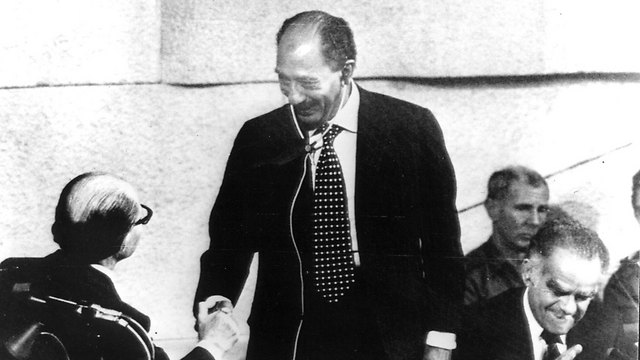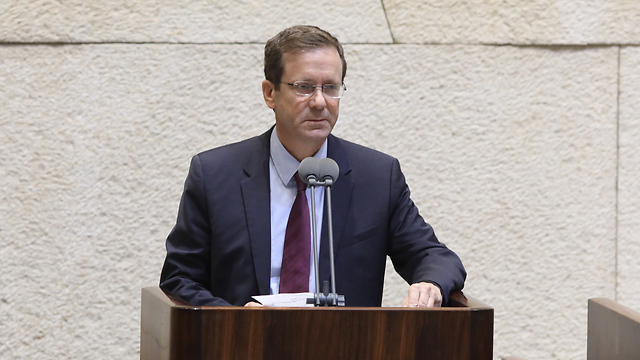
PM laments 'no Palestinian Sadat' on 40-year anniversary of Egyptian leader's visit
PM Netanyahu speaks at Knesset on Tuesday, in session dedicated to Egyptian pres. Sadat's historic visit to Israel in 1979, two years before his assassination; 'I have not yet come across the Palestinian Sadat who will declare his desire to end the conflict,' says Netanyahu, while opposition leader Herzog asks, 'Can peace only come after a sacrifice is made?'
Prime Minister Benjamin Netanyahu spoke at the Knesset on Tuesday, in a session dedicated to then-Egyptian president Anwar Sadat's historic visit to Israel in 1979, which marked a change in policy that ultimately led to the Israeli-Egyptian peace deal.
Speaking to a nearly empty plenum (Knesset Speaker Yuli Edelstein berated MKs and ministers "who are in the building but found it beneath them to take part in this session"), Netanyahu said that sadly, he has never come across a Palestinian leader willing to take a chance for peace, as Sadat did.
"I say with sincere regret, I have not yet come across the Palestinian Sadat who will declare his desire to end the conflict, who will recognize the State of Israel inside borders, whatever they may be, and support our right to live in peace and security."
Netanyahu did, however, add that Sadat’s example could serve for a brighter future.
"Today, four decades after his visit to Israel, in many parts of the Arab world they understand well, not only what happened here 40 years ago, but what can happen in light of changes that are taking place in the region."
He added that despite Sadat's assassination in 1981, the peace between Egypt and Israel remains.

"Sadat fell as a martyr, but with that, the peace remained robust. The peace with Egypt has had its ups and downs, but it has succeeded," he continued, "both during the era of Mubarak’s regime and after."
Netanyahu stressed that peace deals in the region are brokered with entities that invoke respect. "There is a condition to peace, and it is Israel's strength: in the Middle East, you make alliances with the strong and not the weak." to emphasize this point, Netanyahu quoted Sadat, who had declared, 'I have come to make peace with a strong leader,'" referring to then-Israeli prime minister, Menachem Begin.
Netanyahu juxtaposed Sadat's willingness to recognize Israel's legitimacy with many Palestinian leaders' refusal to do so. 'he said, "First comes the recognition of (Israel's—ed) existence and then its right to exist. This is what Sadat did, unlike our Palestinian neighbors, who to this day refuse to recognize the State of Israel's right to exist."
Opposition leader Isaac Herzog spoke after Netanyahu, saying that Sadat's visit "electrified an entire people; the people of Israel received this neighboring leader, who had faced off with the IDF only four years earlier."
History is made by courageous leaders, such as Menachem Begin and Sadat," continued Herzog, who, referring to Sadat, said that "He arrived without a 'but' or a 'maybe.' He stunned the entire world to the extent that he had to open his speech by saying it was not a military or diplomatic ploy. He did a heroic act and was murdered a few weeks later.
"The question that accompanies me on this day is whether it must be so," said Herzog. "Can peace only come after a sacrifice is made?"












